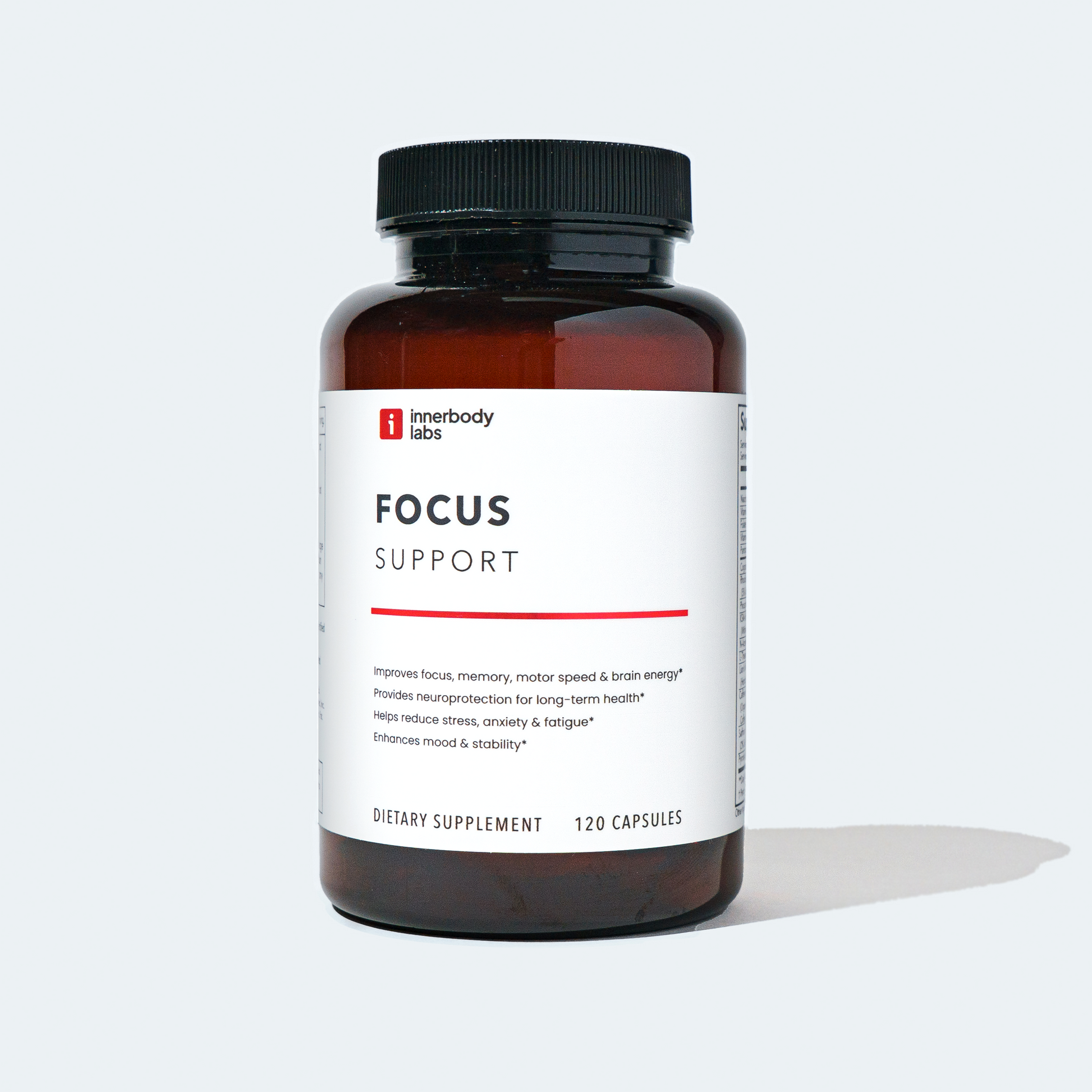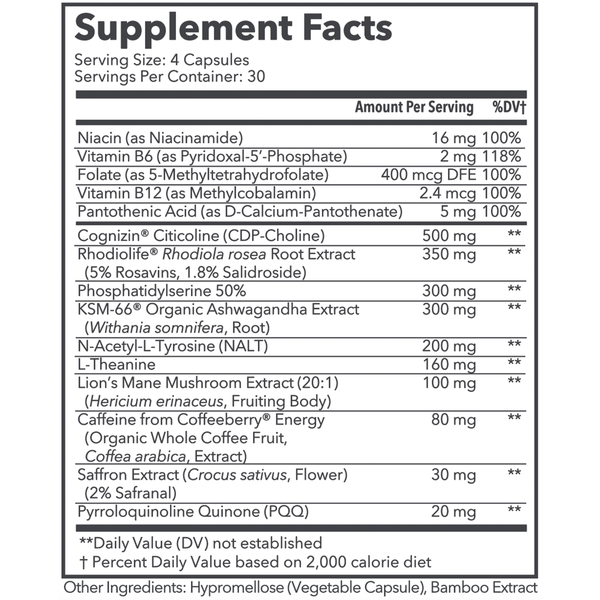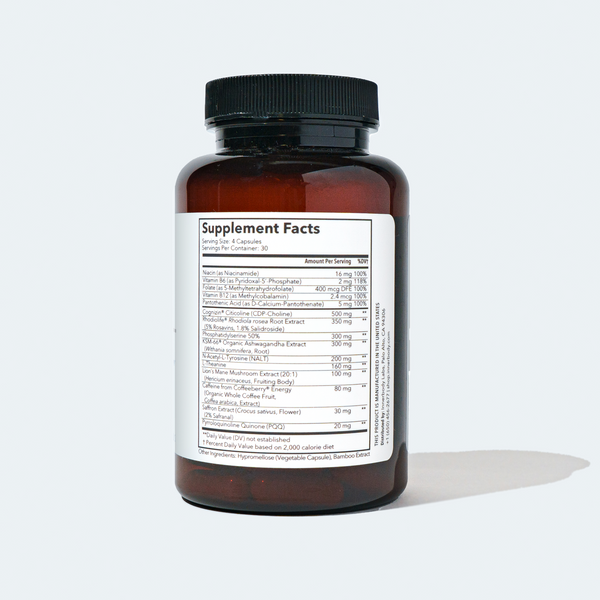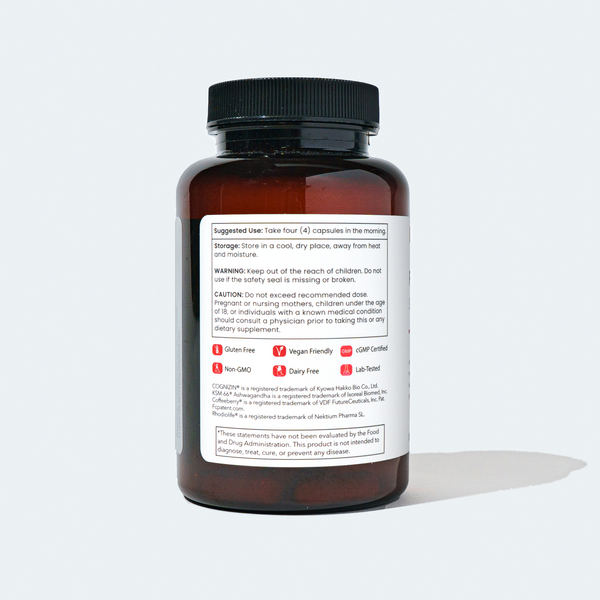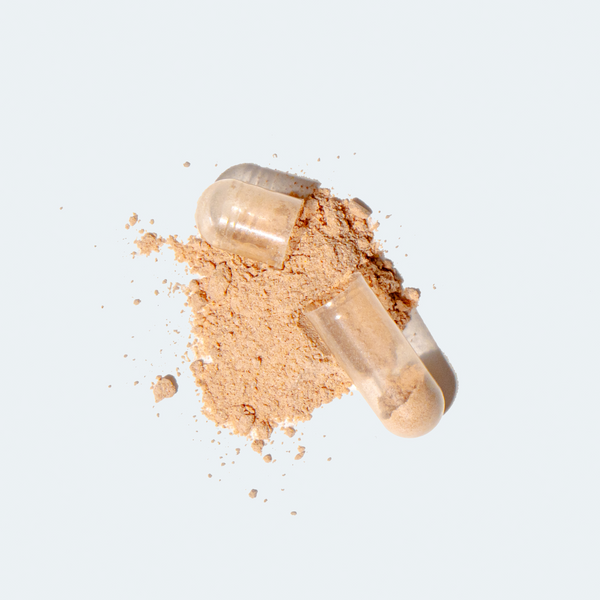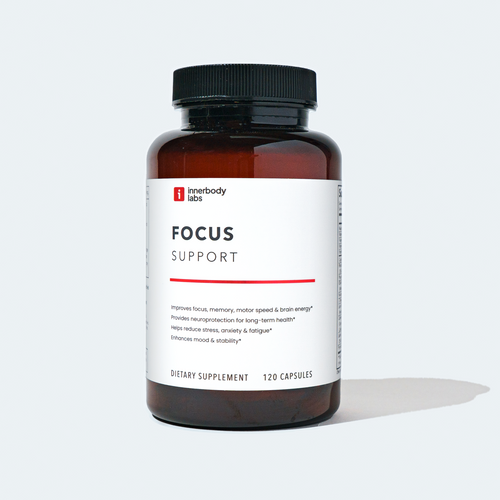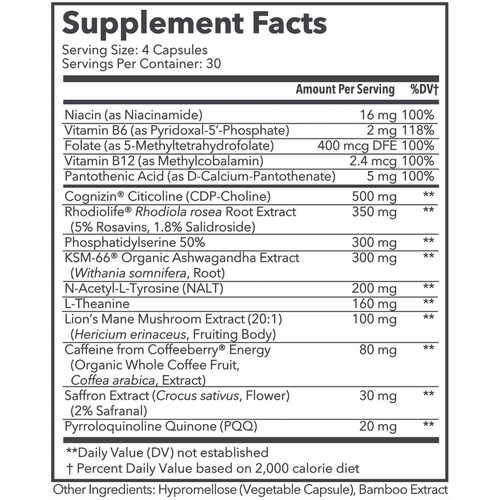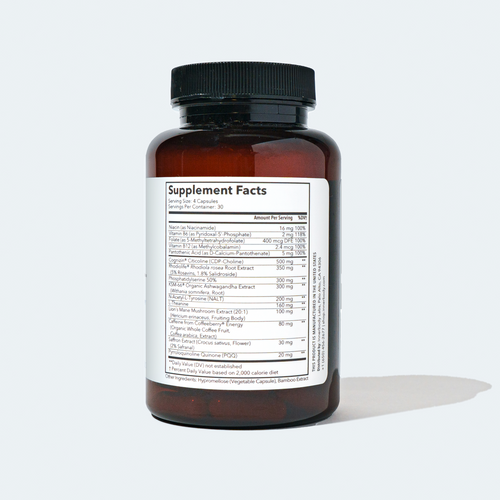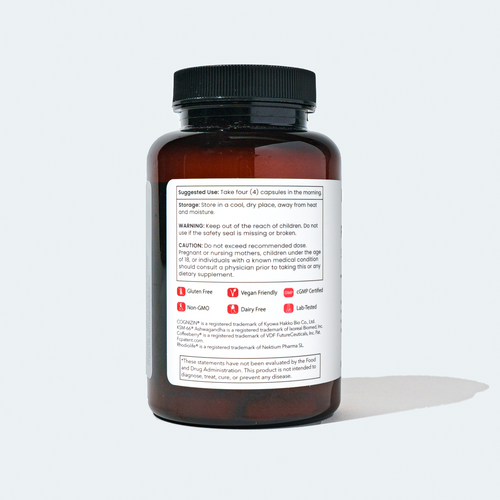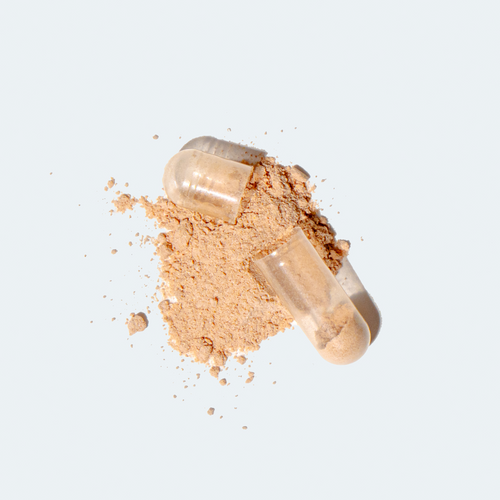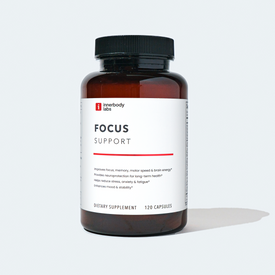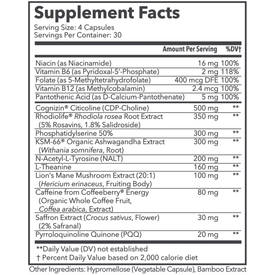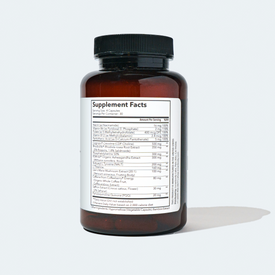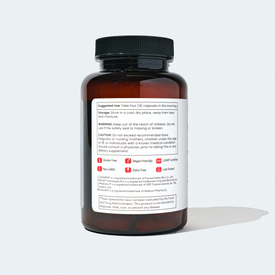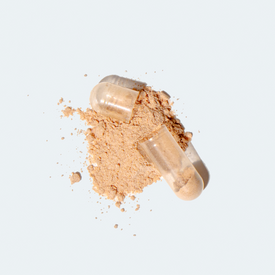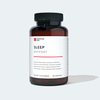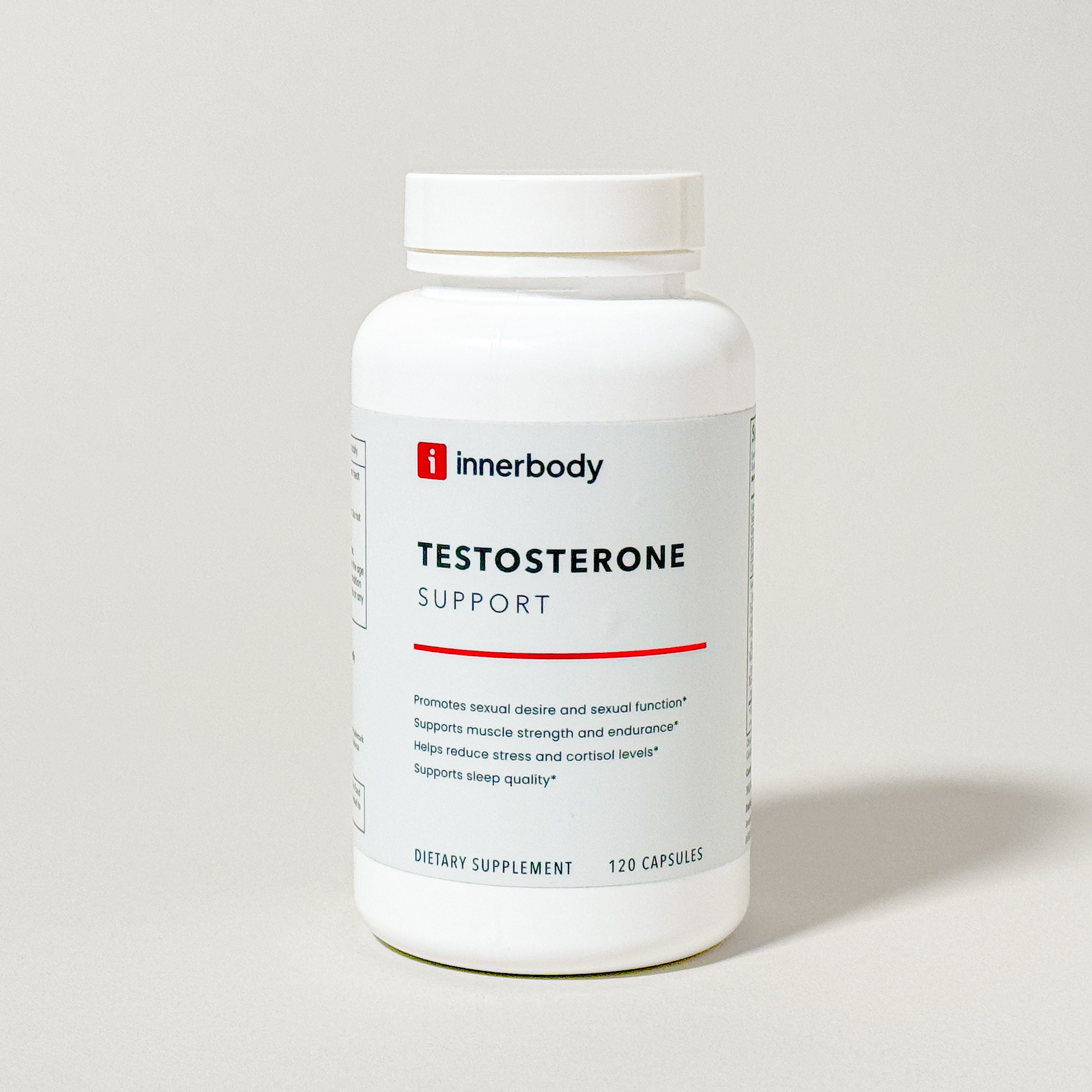A groundbreaking formula for calm, collected focus
Focus Support
Focus Support
Couldn't load pickup availability
Pairs best with
Key Ingredients
- Cognizin® Citicoline
- Rhodiolife® Rhodiola Rosea Root Extract
- KSM-66® Organic Ashwagandha Extract
- Caffeine from Coffeeberry® Energy
- L-Theanine
- Phosphatidylserine 50%
- Lion's Mane Mushroom Extract (20:1)
- Pyrroloquinoline Quinone (PQQ)
- Saffron Extract
- B-Complex
- N-Acetyl-L-Tyrosine (NALT)
 Gluten-Free
Gluten-Free Dairy-Free
Dairy-Free Vegan Friendly
Vegan Friendly Non-GMO
Non-GMO cGMP-Certified
cGMP-Certified Lab-Tested
Lab-Tested
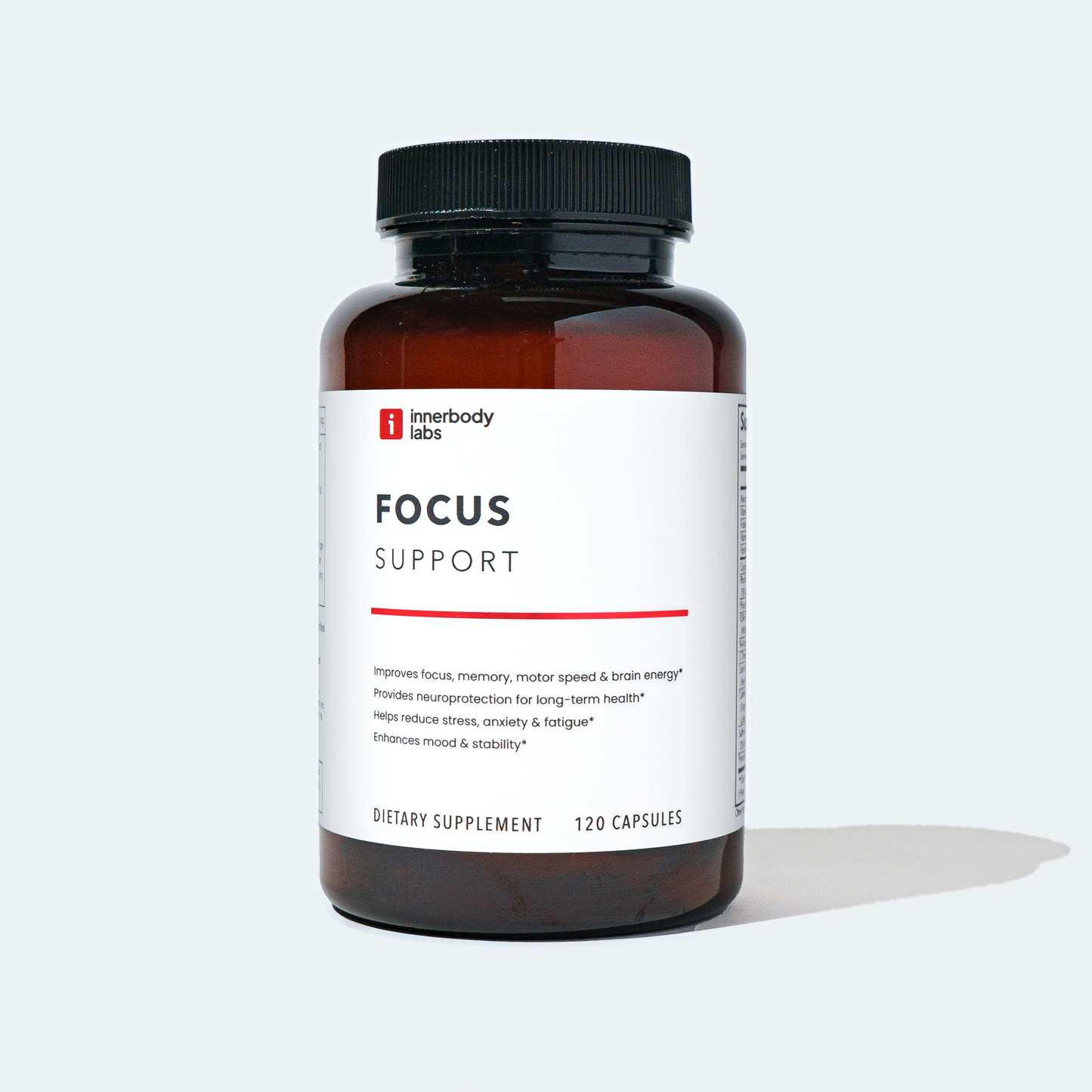
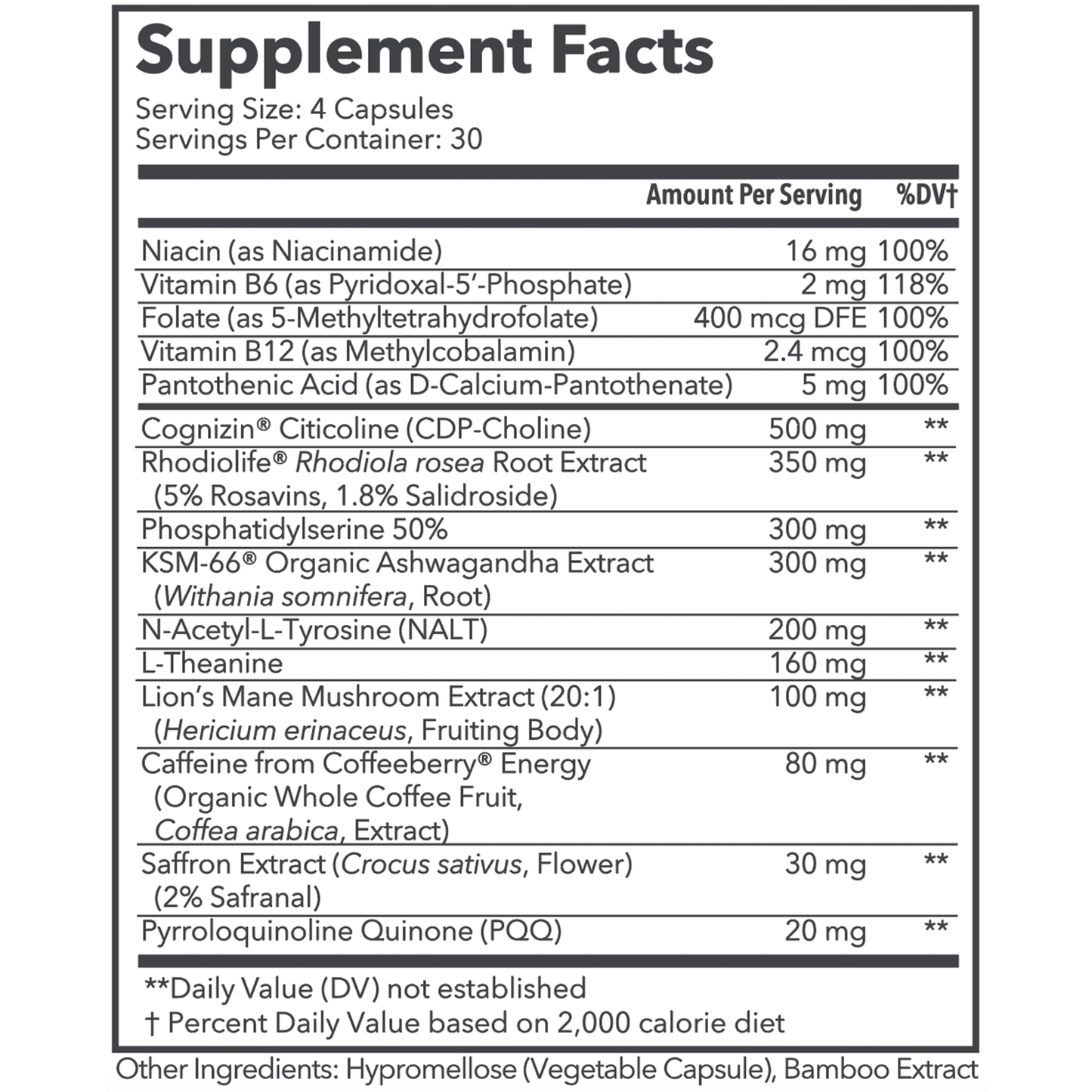
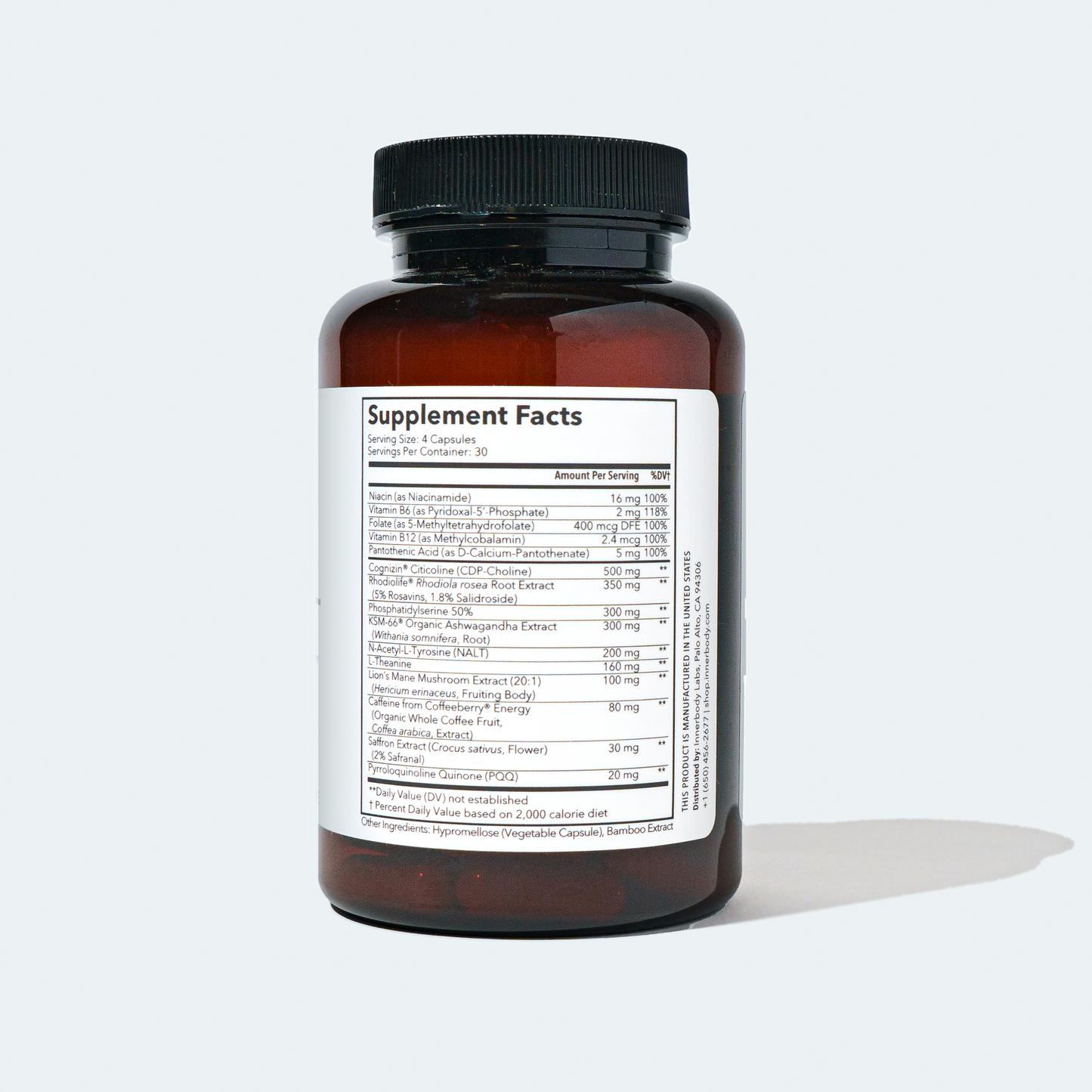
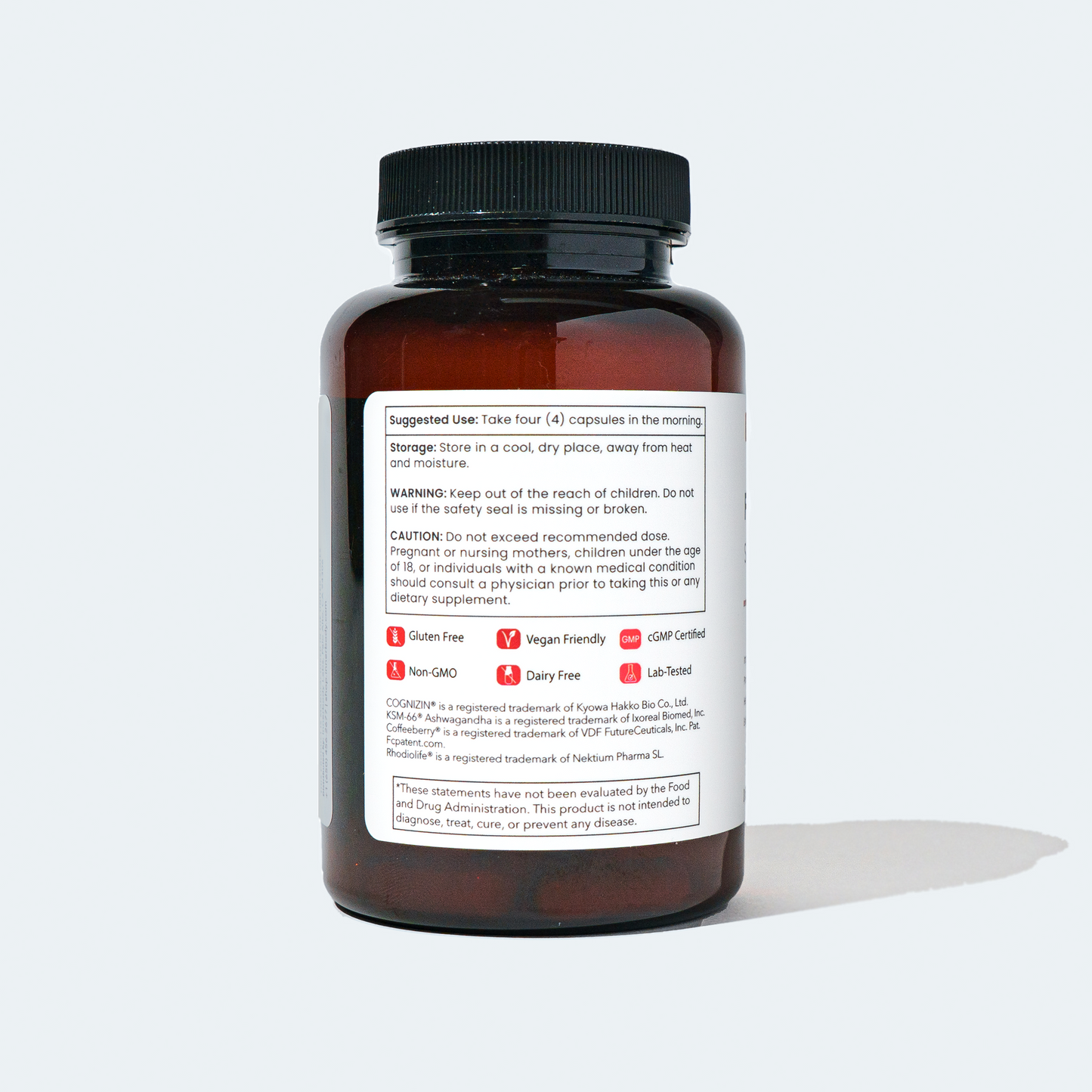
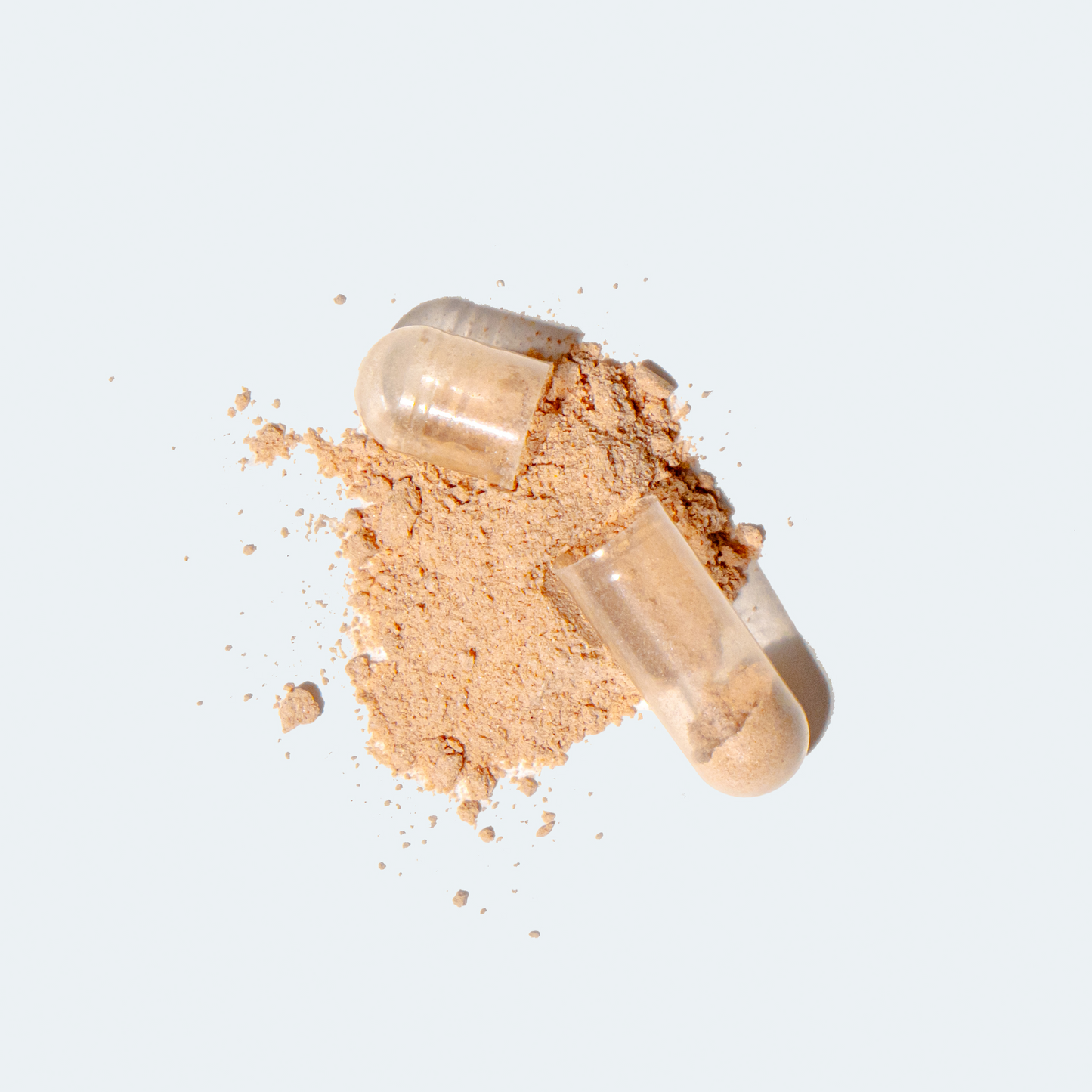
Focus Support
| Amount Per Serving | %DV | |
|---|---|---|
| Folate (as 5-Methyltetrahydrofolate) | 400 mcg DFE | 100% |
| Vitamin B12 (as Methylcobalamin) | 2.4 mcg | 100% |
| Pantothenic Acid (as D-Calcium-Pantothenate) | 5 mg | 100% |
| Cognizin® Citicoline (CDP-Choline) | 500 mg | ** |
| Rhodiolife® Rhodiola rosea Root Extract (5% Rosavins, 1.8% Salidroside) | 350 mg | ** |
| Phosphatidylserine 50% | 300 mg | ** |
| KSM-66® Organic Ashwagandha Extract (Withania somnifera, Root) | 300 mg | ** |
| N-Acetyl-L-Tyrosine (NALT) | 200 mg | ** |
| L-Theanine | 160 mg | ** |
| Lion's Mane Mushroom Extract (20:1) (Hericium erinaceus, Fruiting Body) | 100 mg | ** |
| Caffeine from Coffeeberry® Energy (Organic Whole Coffee Fruit, Coffea arabica, Extract) | 80 mg | ** |
| Saffron Extract (Crocus sativus, Flower) (2% Safranal) | 30 mg | ** |
| Pyrroloquinoline Quinone (PQQ) | 20 mg | ** |
What customers are saying
Week 3: More productive. Stronger memory. Not crashing at all, unlike others. Will keep going for sure, but with bigger order so it's more affordable.
Jeremy A.
Verified BuyerWhat is this magic??? Calms me down a notch without making me groggy... Sharpens my brain without making me wired.
James C.
Verified BuyerThis item really worth it
Steven B.
Verified BuyerIt replaces one of my two morning coffees & MUCH more... not cheap, but WORTH IT.
Rachel D.
Verified BuyerSee what we included and why
| Amount Per Serving | %DV | |
|---|---|---|
| Folate (as 5-Methyltetrahydrofolate) | 400 mcg DFE | 100% |
| Vitamin B12 (as Methylcobalamin) | 2.4 mcg | 100% |
| Pantothenic Acid (as D-Calcium-Pantothenate) | 5 mg | 100% |
| Cognizin® Citicoline (CDP-Choline) | 500 mg | ** |
| Rhodiolife® Rhodiola rosea Root Extract (5% Rosavins, 1.8% Salidroside) | 350 mg | ** |
| Phosphatidylserine 50% | 300 mg | ** |
| KSM-66® Organic Ashwagandha Extract (Withania somnifera, Root) | 300 mg | ** |
| N-Acetyl-L-Tyrosine (NALT) | 200 mg | ** |
| L-Theanine | 160 mg | ** |
| Lion's Mane Mushroom Extract (20:1) (Hericium erinaceus, Fruiting Body) | 100 mg | ** |
| Caffeine from Coffeeberry® Energy (Organic Whole Coffee Fruit, Coffea arabica, Extract) | 80 mg | ** |
| Saffron Extract (Crocus sativus, Flower) (2% Safranal) | 30 mg | ** |
| Pyrroloquinoline Quinone (PQQ) | 20 mg | ** |
| Amount Per Serving | %DV | |
|---|---|---|
| Folate (as 5-Methyltetrahydrofolate) | 400 mcg DFE | 100% |
| Vitamin B12 (as Methylcobalamin) | 2.4 mcg | 100% |
| Pantothenic Acid (as D-Calcium-Pantothenate) | 5 mg | 100% |
| Cognizin® Citicoline (CDP-Choline) | 500 mg | ** |
| Rhodiolife® Rhodiola rosea Root Extract (5% Rosavins, 1.8% Salidroside) | 350 mg | ** |
| Phosphatidylserine 50% | 300 mg | ** |
| KSM-66® Organic Ashwagandha Extract (Withania somnifera, Root) | 300 mg | ** |
| N-Acetyl-L-Tyrosine (NALT) | 200 mg | ** |
| L-Theanine | 160 mg | ** |
| Lion's Mane Mushroom Extract (20:1) (Hericium erinaceus, Fruiting Body) | 100 mg | ** |
| Caffeine from Coffeeberry® Energy (Organic Whole Coffee Fruit, Coffea arabica, Extract) | 80 mg | ** |
| Saffron Extract (Crocus sativus, Flower) (2% Safranal) | 30 mg | ** |
| Pyrroloquinoline Quinone (PQQ) | 20 mg | ** |
See what we included and why
Improve attention, memory, and motor speed*
Citicoline is among several precursors to the critical neurotransmitter acetylcholine, and Cognizin® is the specific branded form of citicoline used most often in human studies. Our 500mg dose has been well tolerated in human studies, and higher doses haven't increased efficacy, making 500mg the ideal dose to include here. Research shows that this dose can:
Bolster mental performance and mood while reducing stress*
The benefits of the botanical ingredient Rhodiola rosea come from two bioactive compounds: rosavins and salidrosides. Using Rhodiolife® guarantees a controlled amount of those two compounds, but we go a step further than our best competitors by offering the form of Rhodiolife® standardized to 5% rosavins and 1.8% salidrosides, allowing our 350mg dose to align with research using a larger quantity of weaker extracts. Human studies show that 4-6 weeks of daily use can:
Reduce cortisol and slow brain aging while strengthening executive function*
Ashwagandha appears in numerous supplements because of its ability, at different doses, to help people achieve a variety of health goals. Its ability to improve cognitive function appears to be not only a direct effect but also a byproduct of other positive effects. Our 300mg of KSM-66 ashwagandha is tailored to provide an effective dose at standardized strength, allowing you to reap the cognitive benefits while stacking it safely with supplements such as our Testosterone Support or others. Human studies show that our dosage can:
Sharpen mental alertness and memory*
Any coffee or tea drinker will readily acknowledge the cognitive benefits of caffeine. At the same time, too much of a good thing can turn focus into jitters, undermining caffeine’s cognitive benefits. That’s why we use Coffeeberry Energy®, an organic whole-fruit coffee berry extract for clean, focused energy. Our dose provides 80mg of caffeine, roughly the same amount as a single shot of espresso — enough to feel its effect, but not so much to require changing your beloved coffee or tea rituals. (And we balance it with L-theanine, as you’ll see below.) As a nootropic, human studies show that caffeine can:
Counteract caffeine jitters while enhancing focus and reaction time*
Those familiar with caffeine-induced jitters can be a thing of the past if you utilize L-theanine alongside it, as we do in our formula. Achieving the proper 2:1 proportion of L-theanine to caffeine is key, based on human research, so this is precisely the balance we achieve with our 160mg of L-theanine. Human studies confirm that L-theanine can:
Improve language and maintain cognitive performance through stress*
Phosphatidylserine is a phospholipid that’s important to cell signalling processes. It has been studied extensively, and our 300mg dose consistently yields positive cognitive results; since higher doses produce similar results, we consider 300mg to be the ideal dose. At this amount, phosphatidylserine can:
Accelerate cognitive speed, enhance neuroprotection, and regulate mood*
Lion’s Mane mushroom shows real promise in cognitive research. Further research will no doubt shed more light on its ability to promote neuroplasticity, but its potential thus far in providing cognitive benefits relies on high doses of 1-2 grams. This is why we use a potent, 20:1 extract, which delivers the equivalent of 2g of lion's mane mushroom per serving. Studies show that this can:
Increase nerve growth factor expression and mitochondrial activation*
We consume small amounts of the powerful antioxidant called pyrroloquinoline quinone (PQQ) in foods like papaya, parsley, and fermented soybeans, and it is also found in human breastmilk. Human studies indicate that PQQ is a powerhouse for neuroprotection and cognitive health. Our 20mg dose is aligned with research that shows it can:
Elevate mood and mimic anti-Alzheimer's drugs for cognitive improvement*
A popular but pricey herb in central Asian cuisine, saffron's medicinal properties lie in bioactive compounds called safranals. These compounds support focus from multiple angles, offering quality of life improvements that go way beyond mere alertness, and our 30mg dose is standardized to contain 2% safranals in every serving — the high end of most clinical research. Specifically, studies show that saffron can:
Prevent cognitive decline and optimize brain function*
B vitamins — especially B6, B9, and B12 — are critical for the brain's physiological and neurological functioning. Not only have deficiencies in several B vitamins been linked to cognitive impairment, but supplementation with B complexes has also been shown to slow cognitive decline. Our formula contains all three at or near 100% of your daily value, as well as B3 and B5 for good measure. Together, these vitamins can:
Fortify dopamine and norepinephrine levels to improve cognitive performance*
The amino acid tyrosine is a precursor to critical neurotransmitters dopamine and norepinephrine, which can decline dramatically under stress. Supplementation helps those numbers stay where they can offer you the most cognitive benefit, and our formula's 200mg provides an ample bump to prevent decline. According to the scientific literature, NALT can:
Supported by clinical research
Improve language and maintain cognitive performance through stress*
PhosphatidylserineReduce cortisol and slow brain aging while strengthening executive function*
AshwagandhaAccelerate cognitive speed, enhance neuroprotection, and regulate mood*
Lion's ManeCounteract caffeine jitters while enhancing focus and reaction time*
L-TheanineElevate mood and mimic anti-Alzheimer's drugs for cognitive improvement*
SaffronIncrease nerve growth factor expression and mitochondrial activation*
PQQMcGlade, E., Agoston, A. M., DiMuzio, J., Kizaki, M., Nakazaki, E., Kamiya, T., & Yurgelun-Todd, D. (2019). The Effect of Citicoline Supplementation on Motor Speed and Attention in Adolescent Males. Journal of Attention Disorders, 23(2), 121–134.
Silveri, M. M., Dikan, J., Ross, A. J., Jensen, J. E., Kamiya, T., Kawada, Y., Renshaw, P. F., & Yurgelun-Todd, D. A. (2008). Citicoline enhances frontal lobe bioenergetics as measured by phosphorus magnetic resonance spectroscopy. NMR in Biomedicine, 21(10), 1066–1075.
Fioravanti, M., & Buckley, A. E. (2006). Citicoline (Cognizin) in the treatment of cognitive impairment. Clinical Interventions in Aging, 1(3), 247.
Nakazaki, E., Mah, E., Sanoshy, K., Citrolo, D., & Watanabe, F. (2021). Citicoline and Memory Function in Healthy Older Adults: A Randomized, Double-Blind, Placebo-Controlled Clinical Trial. The Journal of Nutrition, 151(8), 2153.
Al-Gareeb, A. I. (2020). Citicoline Improves Human Vigilance and Visual Working Memory: The Role of Neuronal Activation and Oxidative Stress. Basic and Clinical Neuroscience, 11(4), 423.
Babb, S. M., Appelmans, K. E., Renshaw, P. F., Wurtman, R. J., & Cohen, B. M. (1996). Differential effect of CDP-choline on brain cytosolic choline levels in younger and older subjects as measured by proton magnetic resonance spectroscopy. Psychopharmacology, 127(2), 88–94.
Spiers, P. A., Myers, D., Hochanadel, G. S., Lieberman, H. R., & Wurtman, R. J. (1996). Citicoline improves verbal memory in aging. Archives of Neurology, 53(5), 441–448.
Alvarez, X. A., Laredo, M., Corzo, D., Fernández-Novoa, L., Mouzo, R., Perea, J. E., Daniele, D., & Cacabelos, R. (1997). Citicoline improves memory performance in elderly subjects. Methods and Findings in Experimental and Clinical Pharmacology, 19(3), 201–210.
Alvarez, X. A., Mouzo, R., Pichel, V., Pérez, P., Laredo, M., Fernández-Novoa, L., Corzo, L., Zas, R., Alcaraz, M., Secades, J. J., Lozano, R., & Cacabelos, R. (1999). Double-blind placebo-controlled study with citicoline in APOE genotyped Alzheimer's disease patients. Effects on cognitive performance, brain bioelectrical activity and cerebral perfusion. Methods and Findings in Experimental and Clinical Pharmacology, 21(9), 633–644.
Caamaño, J., Gómez, M. J., Franco, A., & Cacabelos, R. (1994). Effects of CDP-choline on cognition and cerebral hemodynamics in patients with Alzheimer's disease. Methods and Findings in Experimental and Clinical Pharmacology, 16(3), 211–218.
de la Morena E. (1991). Efficacy of CDP-choline in the treatment of senile alterations in memory. Annals of the New York Academy of Sciences, 640, 233–236.
Olsson, E. M., von Schéele, B., & Panossian, A. G. (2009). A randomised, double-blind, placebo-controlled, parallel-group study of the standardised extract shr-5 of the roots of Rhodiola rosea in the treatment of subjects with stress-related fatigue. Planta Medica, 75(2), 105–112.
Darbinyan, V., Aslanyan, G., Amroyan, E., Gabrielyan, E., Malmström, C., & Panossian, A. (2007). Clinical trial of Rhodiola rosea L. extract SHR-5 in the treatment of mild to moderate depression. Nordic Journal of Psychiatry, 61(5), 343–348.
Darbinyan, V., Kteyan, A., Panossian, A., Gabrielian, E., Wikman, G., & Wagner, H. (2000). Rhodiola rosea in stress induced fatigue--a double blind cross-over study of a standardized extract SHR-5 with a repeated low-dose regimen on the mental performance of healthy physicians during night duty. Phytomedicine : International Journal of Phytotherapy and Phytopharmacology, 7(5), 365–371.
Spasov, A. A., Wikman, G. K., Mandrikov, V. B., Mironova, I. A., & Neumoin, V. V. (2000). A double-blind, placebo-controlled pilot study of the stimulating and adaptogenic effect of Rhodiola rosea SHR-5 extract on the fatigue of students caused by stress during an examination period with a repeated low-dose regimen. Phytomedicine: International Journal of Phytotherapy and Phytopharmacology, 7(2), 85–89.
Mao, J. J., Xie, S. X., Zee, J., Soeller, I., Li, Q. S., Rockwell, K., & Amsterdam, J. D. (2015). Rhodiola rosea versus sertraline for major depressive disorder: A randomized placebo-controlled trial. Phytomedicine: International Journal of Phytotherapy and Phytopharmacology, 22(3), 394.
Bystritsky, A., Kerwin, L., & Feusner, J. D. (2008). A pilot study of Rhodiola rosea (Rhodax) for generalized anxiety disorder (GAD). Journal of Alternative and Complementary Medicine (New York, N.Y.), 14(2), 175–180.
Dimpfel, W., Schombert, L., & Panossian, A. G. (2018). Assessing the Quality and Potential Efficacy of Commercial Extracts of Rhodiola rosea L. By Analyzing the Salidroside and Rosavin Content and the Electrophysiological Activity in Hippocampal Long-Term Potentiation, a Synaptic Model of Memory. Frontiers in Pharmacology, 9, 425.
Stojcheva, E. I., & Quintela, J. C. (2022). The Effectiveness of Rhodiola rosea L. Preparations in Alleviating Various Aspects of Life-Stress Symptoms and Stress-Induced Conditions—Encouraging Clinical Evidence. Molecules, 27(12), 3902.
Zheng, Q., Lu, L., & Zheng, Q. (2018). Rhodiola rosea L. Improves Learning and Memory Function: Preclinical Evidence and Possible Mechanisms. Frontiers in Pharmacology, 9, 1415.
Lee, Y., Jung, C., Jang, S., Kim, J., Ali, Z., Khan, I. A., & Oh, S. (2013). Anti-Inflammatory and Neuroprotective Effects of Constituents Isolated from Rhodiola rosea. Evidence-Based Complementary and Alternative Medicine: ECAM, 2013, 514049.
Lekomtseva, Y., Zhukova, I., & Wacker, A. (2017). Rhodiola rosea in Subjects with Prolonged or Chronic Fatigue Symptoms: Results of an Open-Label Clinical Trial. Complementary Medicine Research, 24(1), 46–52.
Tinsley, G. M., Jagim, A. R., Potter, G. D. M., Garner, D., & Galpin, A. J. (2024). Rhodiola rosea as an adaptogen to enhance exercise performance: a review of the literature. The British Journal of Nutrition, 131(3), 461–473.
Benton, D., Donohoe, R. T., Sillance, B., & Nabb, S. (2001). The influence of phosphatidylserine supplementation on mood and heart rate when faced with an acute stressor. Nutritional Neuroscience, 4(3), 169–178.
Hirayama, S., Terasawa, K., Rabeler, R., Hirayama, T., Inoue, T., Tatsumi, Y., Purpura, M., & Jäger, R. (2014). The effect of phosphatidylserine administration on memory and symptoms of attention-deficit hyperactivity disorder: a randomised, double-blind, placebo-controlled clinical trial. Journal of Human Nutrition and Dietetics: the Official Journal of the British Dietetic Association, 27 Suppl 2, 284–291.
Cenacchi, T., Bertoldin, T., Farina, C., Fiori, M. G., & Crepaldi, G. (1993). Cognitive decline in the elderly: a double-blind, placebo-controlled multicenter study on efficacy of phosphatidylserine administration. Aging (Milan, Italy), 5(2), 123–133.
Maggioni, M., Picotti, G. B., Bondiolotti, G. P., Panerai, A., Cenacchi, T., Nobile, P., & Brambilla, F. (1990). Effects of phosphatidylserine therapy in geriatric patients with depressive disorders. Acta Psychiatrica Scandinavica, 81(3), 265–270.
Crook, T. H., Tinklenberg, J., Yesavage, J., Petrie, W., Nunzi, M. G., & Massari, D. C. (1991). Effects of phosphatidylserine in age-associated memory impairment. Neurology, 41(5), 644–649.
Crook, T., Petrie, W., Wells, C., & Massari, D. C. (1992). Effects of phosphatidylserine in Alzheimer's disease. Psychopharmacology Bulletin, 28(1), 61–66.
Monteleone, P., Beinat, L., Tanzillo, C., Maj, M., & Kemali, D. (1990). Effects of phosphatidylserine on the neuroendocrine response to physical stress in humans. Neuroendocrinology, 52(3), 243–248.
Fünfgeld, E. W., Baggen, M., Nedwidek, P., Richstein, B., & Mistlberger, G. (1989). Double-blind study with phosphatidylserine (PS) in parkinsonian patients with senile dementia of Alzheimer's type (SDAT). Progress in Clinical and Biological Research, 317, 1235–1246.
Rosadini, G., Sannita, W. G., Nobili, F., & Cenacchi, T. (1990). Phosphatidylserine: quantitative EEG effects in healthy volunteers. Neuropsychobiology, 24(1), 42–48.
Monteleone, P., Maj, M., Beinat, L., Natale, M., & Kemali, D. (1992). Blunting by chronic phosphatidylserine administration of the stress-induced activation of the hypothalamo-pituitary-adrenal axis in healthy men. European Journal of Clinical Pharmacology, 42(4), 385–388.
Engel, R. R., Satzger, W., Günther, W., Kathmann, N., Bove, D., Gerke, S., Münch, U., & Hippius, H. (1992). Double-blind cross-over study of phosphatidylserine vs. placebo in patients with early dementia of the Alzheimer type. European Neuropsychopharmacology: The Journal of the European College of Neuropsychopharmacology, 2(2), 149–155.
Chandrasekhar, K., Kapoor, J., & Anishetty, S. (2012). A Prospective, Randomized Double-Blind, Placebo-Controlled Study of Safety and Efficacy of a High-Concentration Full-Spectrum Extract of Ashwagandha Root in Reducing Stress and Anxiety in Adults. Indian Journal of Psychological Medicine, 34(3), 255.
Salve, J., Pate, S., Debnath, K., & Langade, D. (2019). Adaptogenic and Anxiolytic Effects of Ashwagandha Root Extract in Healthy Adults: A Double-blind, Randomized, Placebo-controlled Clinical Study. Cureus, 11(12), e6466.
Lopresti, A. L., Smith, S. J., Malvi, H., & Kodgule, R. (2019). An investigation into the stress-relieving and pharmacological actions of an ashwagandha (Withania somnifera) extract: A randomized, double-blind, placebo-controlled study. Medicine, 98(37), e17186.
Deshpande, A., Irani, N., Balkrishnan, R., & Benny, I. R. (2020). A randomized, double blind, placebo controlled study to evaluate the effects of ashwagandha (Withania somnifera) extract on sleep quality in healthy adults. Sleep Medicine, 72, 28-36.
Jagota, A., & Kowshik, K. (2017). Therapeutic effects of ashwagandha in brain aging and clock dysfunction. In (eds) Science of Ashwagandha: Preventative and Therapeutic Potentials, 437-456. Springer, Cham.
Baker, C., Kirby, J. B., O’Connor, J., Lindsay, K. G., Hutchins, A., & Harris, M. (2022). The perceived impact of ashwagandha on stress, sleep quality, energy, and mental clarity for college students: Qualitative analysis of a double-blind randomized control trial. Journal of Medicinal Food, 25(12), 1095-1101.
Gopukumar, K., Thanawala, S., Somepalli, V., Sathyanaryana Rao, T. S., Thamatam, V. B., & Chauhan, S. (2021). Efficacy and Safety of Ashwagandha Root Extract on Cognitive Functions in Healthy, Stressed Adults: A Randomized, Double-Blind, Placebo-Controlled Study. Evidence-Based Complementary and Alternative Medicine, 2021(1), 8254344.
Choudhary, D., Bhattacharyya, S., & Joshi, K. (2017). Body Weight Management in Adults Under Chronic Stress Through Treatment With Ashwagandha Root Extract. Journal of Evidence-Based Complementary & Alternative Medicine.
Ng, Q. X., Loke, W., Foo, N. X., Tan, W. J., Chan, H. W., Lim, D. Y., & Yeo, W. S. (2020). A systematic review of the clinical use of Withania somnifera (Ashwagandha) to ameliorate cognitive dysfunction. Phytotherapy Research, 34(3), 583-590.
Zahiruddin, S., Basist, P., Parveen, A., Parveen, R., Khan, W., & Ahmad, S. (2020). Ashwagandha in brain disorders: A review of recent developments. Journal of Ethnopharmacology, 257, 112876.
Mishra, D. N., & Kumar, M. (2024). Shoden promotes Relief from stress and anxiety: A randomized, double-blind, placebo-controlled study on healthy subjects with high stress levels. Heliyon, 10(17), e36885.
Szućko-Kociuba, I., Trzeciak-Ryczek, A., Kupnicka, P., & Chlubek, D. (2023). Neurotrophic and Neuroprotective Effects of Hericium erinaceus. International Journal of Molecular Sciences, 24(21), 15960.
Cornford, N., & Charnley, M. (2025). Hericium erinaceus: A possible future therapeutic treatment for the prevention and delayed progression of Alzheimer's disease? - A narrative review. Nutrition Research Reviews, 1–15. Advance online publication.
Vigna, L., Morelli, F., Agnelli, G. M., Napolitano, F., Ratto, D., Occhinegro, A., Iorio, C. D., Savino, E., Girometta, C., Brandalise, F., & Rossi, P. (2019). Hericium erinaceus Improves Mood and Sleep Disorders in Patients Affected by Overweight or Obesity: Could Circulating Pro-BDNF and BDNF Be Potential Biomarkers?Evidence-Based Complementary and Alternative Medicine: ECAM, 2019, 7861297.
Mori, K., Inatomi, S., Ouchi, K., Azumi, Y., & Tuchida, T. (2009). Improving effects of the mushroom Yamabushitake (Hericium erinaceus) on mild cognitive impairment: a double-blind placebo-controlled clinical trial. Phytotherapy Research: PTR, 23(3), 367–372.
Docherty, S., Doughty, F. L., & Smith, E. F. (2023). The Acute and Chronic Effects of Lion’s Mane Mushroom Supplementation on Cognitive Function, Stress and Mood in Young Adults: A Double-Blind, Parallel Groups, Pilot Study. Nutrients, 15(22), 4842.
Contato, A. G., & Conte-Junior, C. A. (2025). Lion’s Mane Mushroom (Hericium erinaceus): A Neuroprotective Fungus with Antioxidant, Anti-Inflammatory, and Antimicrobial Potential—A Narrative Review. Nutrients, 17(8), 1307.
Nagano, M., Shimizu, K., Kondo, R., Hayashi, C., Sato, D., Kitagawa, K., & Ohnuki, K. (2010). Reduction of depression and anxiety by 4 weeks Hericium erinaceus intake. Biomedical Research (Tokyo, Japan), 31(4), 231–237.
Saitsu, Y., Nishide, A., Kikushima, K., Shimizu, K., & Ohnuki, K. (2019). Improvement of cognitive functions by oral intake of Hericium erinaceus. Biomedical Research (Tokyo, Japan), 40(4), 125–131.
Friedman M. (2015). Chemistry, Nutrition, and Health-Promoting Properties of Hericium erinaceus (Lion's Mane) Mushroom Fruiting Bodies and Mycelia and Their Bioactive Compounds. Journal of Agricultural and Food Chemistry, 63(32), 7108–7123.
Chong, P. S., Fung, M., Wong, K. H., & Lim, L. W. (2020). Therapeutic Potential of Hericium erinaceus for Depressive Disorder. International Journal of Molecular Sciences, 21(1), 163.
- Loke, W. H. (1988). Effects of caffeine on mood and memory. Physiology & Behavior, 44(3), 367-372.
- Oei, A., & Hartley, L. R. (2005). The effects of caffeine and expectancy on attention and memory. Human Psychopharmacology: Clinical and Experimental, 20(3), 193-202.Sherman, S. M., Buckley, T. P., Baena, E., & Ryan, L. (2016). Caffeine Enhances Memory Performance in Young Adults during Their Non-optimal Time of Day. Frontiers in Psychology, 7, 215446.
- Nehlig, A., Daval, J. L., & Debry, G. (1992). Caffeine and the central nervous system: mechanisms of action, biochemical, metabolic and psychostimulant effects. Brain Research. Brain Research Reviews, 17(2), 139–170.
- Giesbrecht, T., Rycroft, J. A., Rowson, M. J., & De Bruin, E. A. (2010). The combination of L-theanine and caffeine improves cognitive performance and increases subjective alertness. Nutritional Neuroscience, 13(6), 283–290.
- Alhowail A. (2019). Candidate mechanisms of caffeine improving memory dysfunction. Die Pharmazie, 74(12), 705–710.
- Lawson, S. C., Tonkin, S. S., Ziegler, A. M., & Temple, J. L. (2020). Caffeine Enhances Sustained Attention Among Adolescents. Experimental and Clinical Psychopharmacology, 29(1), 82.
- Vázquez, J. C., Palomé, J. L., & Redolar-Ripoll, D. (2022). Effects of Caffeine Consumption on Attention Deficit Hyperactivity Disorder (ADHD) Treatment: A Systematic Review of Animal Studies. Nutrients, 14(4), 739.
- Glade, M. J. (2010). Caffeine—Not just a stimulant. Nutrition, 26(10), 932-938.
- Nehlig, A., & Boyet, S. (2000). Dose–response study of caffeine effects on cerebral functional activity with a specific focus on dependence. Brain Research, 858(1), 71-77.
- Zhang, R., & Madan, C. R. (2021). How does caffeine influence memory? Drug, experimental, and demographic factors. Neuroscience & Biobehavioral Reviews, 131, 525-538.
- Cappelletti, S., Daria, P., Sani, G., & Aromatario, M. (2015). Caffeine: Cognitive and Physical Performance Enhancer or Psychoactive Drug?Current Neuropharmacology, 13(1), 71.
- Kimura, K., Ozeki, M., Juneja, L. R., & Ohira, H. (2007). L-Theanine reduces psychological and physiological stress responses. Biological Psychology, 74(1), 39–45.
- Baba, Y., Inagaki, S., Nakagawa, S., Kaneko, T., Kobayashi, M., & Takihara, T. (2021). Effects of l-Theanine on Cognitive Function in Middle-Aged and Older Subjects: A Randomized Placebo-Controlled Study. Journal of Medicinal Food, 24(4), 333.
- Higashiyama, A., Htay, H. H., Ozeki, M., Juneja, L. R., & Kapoor, M. P. (2011). Effects of l-theanine on attention and reaction time response. Journal of Functional Foods, 3(3), 171-178.
- Nobre, A. C., Rao, A., & Owen, G. N. (2008). L-theanine, a natural constituent in tea, and its effect on mental state. Asia Pacific Journal of Clinical Nutrition, 17 Suppl 1, 167–168.
- Li, Y., Liu, Y., Wu, T., Kenaan, A., Geng, F., Li, B., Gunaratne, A., Li, H., & Gan, Y. (2022). L-Theanine: A Unique Functional Amino Acid in Tea (Camellia sinensis L.) With Multiple Health Benefits and Food Applications. Frontiers in Nutrition, 9, 853846.
- Kelly, S. P., Gomez-Ramirez, M., Montesi, J. L., & Foxe, J. J. (2008). L-Theanine and Caffeine in Combination Affect Human Cognition as Evidenced by Oscillatory alpha-Band Activity and Attention Task Performance. The Journal of Nutrition, 138(8), 1572S-1577S.
- Dashwood, R., & Visioli, F. (2025). L-theanine: From tea leaf to trending supplement – does the science match the hype for brain health and relaxation?Nutrition Research, 134, 39-48.
- Nematizadeh, M., Ghorbanzadeh, H., Moghaddam, H. S., Shalbafan, M., Boroon, M., Keshavarz-Akhlaghi, A. A., & Akhondzadeh, S. (2023). L-theanine combination therapy with fluvoxamine in moderate-to-severe obsessive-compulsive disorder: A placebo-controlled, double-blind, randomized trial. Psychiatry and Clinical Neurosciences, 77(9), 478–485.
- Giesbrecht, T., Rycroft, J. A., Rowson, M. J., & De Bruin, E. A. (2010). The combination of L-theanine and caffeine improves cognitive performance and increases subjective alertness. Nutritional Neuroscience, 13(6), 283–290.
- Juneja, L. R., Chu, D., Okubo, T., Nagato, Y., & Yokogoshi, H. (1999). L-theanine—A unique amino acid of green tea and its relaxation effect in humans. Trends in Food Science & Technology, 10(6-7), 199-204.
- Owen, G. N., Parnell, H., De Bruin, E. A., & Rycroft, J. A. (2008). The combined effects of L-theanine and caffeine on cognitive performance and mood.Nutritional Neuroscience, 11(4), 193–198.
- Bulman, A., Marx, W., Turner, M., McKune, A., & Naumovski, N. (2023). The Effects of L-Theanine Supplementation on Quality of Sleep: A Systematic Review.Proceedings, 91(1), 32.
- Sohail, A. A., Ortiz, F., Varghese, T., Fabara, S. P., Batth, A. S., Sandesara, D. P., Sabir, A., Khurana, M., Datta, S., & Patel, U. K. (2021). The Cognitive-Enhancing Outcomes of Caffeine and L-theanine: A Systematic Review. Cureus, 13(12), e20828.
Avgerinos, K. I., Vrysis, C., Chaitidis, N., Kolotsiou, K., Myserlis, P. G., & Kapogiannis, D. (2020). Effects of saffron (Crocus Sativus L) on cognitive function. A systematic review of RCTs. Neurological Sciences: Official Journal of the Italian Neurological Society and of the Italian Society of Clinical Neurophysiology, 41(10), 2747.
Akhondzadeh, S., Sabet, M. S., Harirchian, M. H., Togha, M., Cheraghmakani, H., Razeghi, S., Hejazi, S. S.h, Yousefi, M. H., Alimardani, R., Jamshidi, A., Zare, F., & Moradi, A. (2010). Saffron in the treatment of patients with mild to moderate Alzheimer's disease: a 16-week, randomized and placebo-controlled trial. Journal of Clinical Pharmacy and Therapeutics, 35(5), 581–588.
Ayati, Z., Yang, G., Ayati, M.H. et al. (2020). Saffron for mild cognitive impairment and dementia: a systematic review and meta-analysis of randomised clinical trials. BMC Complement Med Ther 20, 333.
Tsolaki, M., Karathanasi, E., Lazarou, I., Dovas, K., Verykouki, E., Karacostas, A., Georgiadis, K., Tsolaki, A., Adam, K., Kompatsiaris, I., & Sinakos, Z. (2016). Efficacy and Safety of Crocus sativus L. in Patients with Mild Cognitive Impairment: One Year Single-Blind Randomized, with Parallel Groups, Clinical Trial. Journal of Alzheimer's Disease: JAD, 54(1), 129–133.
Farokhnia, M., Shafiee Sabet, M., Iranpour, N., Gougol, A., Yekehtaz, H., Alimardani, R., Farsad, F., Kamalipour, M., & Akhondzadeh, S. (2014). Comparing the efficacy and safety of Crocus sativus L. with memantine in patients with moderate to severe Alzheimer's disease: a double-blind randomized clinical trial. Human psychopharmacology,29(4), 351–359.
Kell, G., Rao, A., Beccaria, G., Clayton, P., Inarejos-García, A. M., & Prodanov, M. (2017). affron® a novel saffron extract (Crocus sativus L.) improves mood in healthy adults over 4 weeks in a double-blind, parallel, randomized, placebo-controlled clinical trial. Complementary Therapies in Medicine, 33, 58–64.
Lopresti, A. L., Smith, S. J., Metse, A. P., & Drummond, P. D. (2020). Effects of saffron on sleep quality in healthy adults with self-reported poor sleep: A randomized, double-blind, placebo-controlled trial. Journal of Clinical Sleep Medicine: Official Publication of the American Academy of Sleep Medicine, 16(6), 937.
Ahmadpanah, M., Ramezanshams, F., Ghaleiha, A., Akhondzadeh, S., Sadeghi Bahmani, D., & Brand, S. (2019). Crocus Sativus L. (saffron) versus sertraline on symptoms of depression among older people with major depressive disorders-a double-blind, randomized intervention study. Psychiatry Research, 282, 112613.
Cerdá-Bernad, D., Costa, L., Serra, A. T., Bronze, M. R., Valero-Cases, E., Pérez-Llamas, F., Candela, M. E., Arnao, M. B., Barberán, F. T., Villalba, R. G., García-Conesa, T., & Frutos, J. (2022). Saffron against Neuro-Cognitive Disorders: An Overview of Its Main Bioactive Compounds, Their Metabolic Fate and Potential Mechanisms of Neurological Protection. Nutrients, 14(24), 5368.
Shafiee, M., Arekhi, S., Omranzadeh, A., & Sahebkar, A. (2018). Saffron in the treatment of depression, anxiety and other mental disorders: Current evidence and potential mechanisms of action. Journal of Affective Disorders, 227, 330-337.
Sadat Rafiei, S. K., Abolghasemi, S., Frashidi, M., Ebrahimi, S., Gharei, F., Razmkhah, Z., Tavousi, N., Mahmoudvand, B., Faani, M., Karimi, N., Abdi, A., Soleimanzadeh, M., Youshanlui, M. A., Sadatmadani, F., Alikhani, R., Pishkari, Y., & Deravi, N. (2023). Saffron and Sleep Quality: A Systematic Review of Randomized Controlled Trials. Nutrition and Metabolic Insights, 16, 11786388231160317.
Corridori, E., Salviati, S., Demontis, M. G., Vignolini, P., Vita, C., Fagiolini, A., Cuomo, A., Carmellini, P., Gambarana, C., & Scheggi, S. (2025). Therapeutic Potential of Saffron Extract in Mild Depression: A Study of Its Role on Anhedonia in Rats and Humans. Phytotherapy Research, 39(3), 1277.
Ikemoto, K., Mohamad Ishak, N. S., & Akagawa, M. (2024). The effects of pyrroloquinoline quinone disodium salt on brain function and physiological processes. The Journal of Medical Investigation: JMI, 71(1.2), 23–28.
Tamakoshi, M., Suzuki, T., Nishihara, E., Nakamura, S., & Ikemoto, K. (2023). Pyrroloquinoline quinone disodium salt improves brain function in both younger and older adults. Food & Function, 14(5), 2496–2501.
Itoh, Y., Hine, K., Miura, H., Uetake, T., Nakano, M., Takemura, N., & Sakatani, K. (2016). Effect of the Antioxidant Supplement Pyrroloquinoline Quinone Disodium Salt (BioPQQ™) on Cognitive Functions. Advances in Experimental Medicine and Biology, 876, 319–325.
Sangha, V., Aboulhassane, S., Qu, Q. R., & Bendayan, R. (2023). Protective effects of pyrroloquinoline quinone in brain folate deficiency. Fluids and Barriers of the CNS, 20, 84.
Shiojima, Y., Takahashi, M., Takahashi, R., Moriyama, H., Bagchi, D., Bagchi, M., & Akanuma, M. (2022). Effect of Dietary Pyrroloquinoline Quinone Disodium Salt on Cognitive Function in Healthy Volunteers: A Randomized, Double-Blind, Placebo-Controlled, Parallel-Group Study. Journal of the American Nutrition Association, 41(8), 796–809.
Baltic, S., Nedeljkovic, D., Todorovic, N., Ranisavljev, M., Korovljev, D., Cvejic, J., Ostojic, J., LeBaron, T. W., Timmcke, J., Stajer, V., & Ostojic, S. M. (2024). The impact of six-week dihydrogen-pyrroloquinoline quinone supplementation on mitochondrial biomarkers, brain metabolism, and cognition in elderly individuals with mild cognitive impairment: a randomized controlled trial. The Journal of Nutrition, Health & Aging, 28(8), 100287.
Zhang, P., Ye, Y., Qian, Y., Yin, B., Zhao, J., Zhu, S., Zhang, L., & Yan, M. (2017). The Effect of Pyrroloquinoline Quinone on Apoptosis and Autophagy in Traumatic Brain Injury. CNS & Neurological Disorders Drug Targets, 16(6), 724–736.
Li, X., Sun, Y., Zhou, Z., Li, J., Liu, S., Chen, L., Shi, Y., Wang, M., Zhu, Z., Wang, G., & Lu, Q. (2024). Deep Learning‐Driven Exploration of Pyrroloquinoline Quinone Neuroprotective Activity in Alzheimer's Disease. Advanced Science, 11(18), 2308970.
Ye, Y., Zhang, P., Qian, Y., Yin, B., & Yan, M. (2017). The Effect of Pyrroloquinoline Quinone on the Expression of WISP1 in Traumatic Brain Injury. Stem Cells International, 2017, 4782820.
Zhang, L., Liu, J., Cheng, C., Yuan, Y., Yu, B., Shen, A., & Yan, M. (2012). The Neuroprotective Effect of Pyrroloquinoline Quinone on Traumatic Brain Injury. Journal of Neurotrauma, 29(5), 851.
Wen, J., Shen, J., Zhou, Y., Zhao, X., Dai, Z., & Jin, Y. (2020). Pyrroloquinoline quinone attenuates isoproterenol hydrochloride-induced cardiac hypertrophy in AC16 cells by inhibiting the NF-κB signaling pathway. International Journal of Molecular Medicine, 45(3), 873.
Jonscher, K. R., Chowanadisai, W., & Rucker, R. B. (2021). Pyrroloquinoline-Quinone Is More Than an Antioxidant: A Vitamin-like Accessory Factor Important in Health and Disease Prevention. Biomolecules, 11(10), 1441.
Jongkees, B. J., Hommel, B., Kühn, S., & Colzato, L. S. (2015). Effect of tyrosine supplementation on clinical and healthy populations under stress or cognitive demands--A review. Journal of Psychiatric Research, 70, 50–57.
Steenbergen, L., Sellaro, R., Hommel, B., & Colzato, L. S. (2015). Tyrosine promotes cognitive flexibility: evidence from proactive vs. reactive control during task switching performance. Neuropsychologia, 69, 50–55.
Bloemendaal, M., Froböse, M. I., Wegman, J., Zandbelt, B. B., Cools, R., & Aarts, E. (2018). Neuro-Cognitive Effects of Acute Tyrosine Administration on Reactive and Proactive Response Inhibition in Healthy Older Adults. ENeuro, 5(2), ENEURO.0035-17.2018.
Hase, A., Jung, S. E., & Aan het Rot, M. (2015). Behavioral and cognitive effects of tyrosine intake in healthy human adults. Pharmacology Biochemistry and Behavior, 133, 1-6.
Coull, N. A., Watkins, S. L., Aldous, J. W., Warren, L. K., Chrismas, B. C., Dascombe, B., Mauger, A. R., Abt, G., & Taylor, L. (2015). Effect of tyrosine ingestion on cognitive and physical performance utilising an intermittent soccer performance test (iSPT) in a warm environment. European Journal of Applied Physiology, 115(2), 373–386.
Deijen, J. B., & Orlebeke, J. F. (1994). Effect of tyrosine on cognitive function and blood pressure under stress. Brain Research Bulletin, 33(3), 319–323.
Thomas, J. R., Lockwood, P. A., Singh, A., & Deuster, P. A. (1999). Tyrosine Improves Working Memory in a Multitasking Environment. Pharmacology Biochemistry and Behavior, 64(3), 495-500.
Mahoney, C. R., Castellani, J., Kramer, F. M., Young, A., & Lieberman, H. R. (2007). Tyrosine supplementation mitigates working memory decrements during cold exposure. Physiology & Behavior, 92(4), 575-582.
Kennedy, D. O. (2016). B Vitamins and the Brain: Mechanisms, Dose and Efficacy—A Review. Nutrients, 8(2), 68.
Wang, Z., Zhu, W., Xing, Y., Jia, J., & Tang, Y. (2022). B vitamins and prevention of cognitive decline and incident dementia: a systematic review and meta-analysis. Nutrition Reviews, 80(4), 931–949.
Smith, A. D., & Refsum, H. (2016). Homocysteine, B Vitamins, and Cognitive Impairment. Annual Review of Nutrition, 36, 211–239.
Morris, M. S. (2012). The Role of B Vitamins in Preventing and Treating Cognitive Impairment and Decline. Advances in Nutrition, 3(6), 801.
Ford, A. H., & Almeida, O. P. (2019). Effect of Vitamin B Supplementation on Cognitive Function in the Elderly: A Systematic Review and Meta-Analysis. Drugs & aging, 36(5), 419–434.
Xu, H., Wang, S., Gao, F., & Li, C. (2022, March 9). Vitamin B6, B9, and B12 Intakes and Cognitive Performance in Elders: National Health and Nutrition Examination Survey, 2011–2014. Neuropsychiatr Dis Treat. 2022;18:537-553.
Chang, B., Wang, Z., Xu, T., Chen, J., Zhang, Y., Huang, Y., & Sun, D. (2023). Effectiveness of vitamin-B supplements on cognition in older adults: A meta-analysis. Geriatric Nursing, 51, 143-149.
Kim, H., Kim, G., Jang, W., Kim, S. Y., & Chang, N. (2014). Association between intake of B vitamins and cognitive function in elderly Koreans with cognitive impairment. Nutrition Journal, 13, 118.

Ashwagandha (KSM-66®)
Clinical trials have validated the traditional Ayurvedic medical approach of using ashwagandha (Withania somnifera) to help the body manage stress. But studies show that this adaptogenic herb native to India and North Africa can bring additional benefits, such as improved sleep and cognition.

Rhodiola (Rhodiolife®)
Native to arctic regions of North America, Asia, and Europe, Rhodiola rosea is a shrub that produces attractive yellow flowers, but its roots have been the focus of traditional medicinal use. Our potent, branded extract can elevate cognition, focus, and mood while reducing anxiety.

Lion's mane mushroom
An adaptogenic mushroom native in temperate regions of the northern hemisphere, lion's mane (Hericium erinaceus) has been prized for centuries in both Chinese medicine and, for the lucky forager, on the dinner plate. Our potent extract packs 2g of fruiting body into each serving to achieve cognitive benefits.

Saffron
Saffron is an age-old cooking spice, coloring agent, and traditional medicine that comes from the delicate styles and stigma of the Crocus sativus flower. More recently, clinical studies have confirmed its ability to improve mood, reduce stress, and enhance cognition. It's both an adaptogen and a nootropic.

Whole coffee berries (Coffeeberry® Energy)
Coffee arabica plants produce small, fragrant white blossoms, which are soon replaced by bright red berries. It's the beans within these berries that people ultimately roast for brewing. Alongside caffeine, a whole-berry extract like ours is a trove of antioxidants, essential amino acids, and other nutrients.
Customer reviews
What customers are saying about sleep support+ *- FrankI recommend this productRated 5 out of 5 stars3 weeks ago5 Stars
Speedy delivery. Good value
Was this helpful? - ana g.Verified BuyerI recommend this productRated 5 out of 5 stars1 month agothe routine is working
so here's what i do since literally no one asked, nor will they ever. i take 2 of these focus pills each morning, and i take the full dose of sleep support at night. if i take 4 focus, it doesn't agree with me for some reason, i get a mild headache. but 2 a day is so good for me. i work and focus, i'm sharp as a freakin tack, and i sleep like a log. my problems are solved, and i'm weathering the great unraveling in style my friends. you can too.
Was this helpful? - Pat S.Verified BuyerI recommend this productRated 5 out of 5 stars1 month agoMemory boosted!
Forgetting names was driving me bat$h!t, and I could not believe it at first, but I'm absolutely convinced this has helped. My recall is actually better now. I take a full serving by the way.
Was this helpful?
Pairs best with
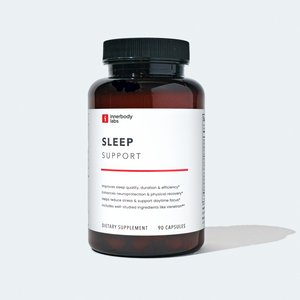
Sleep Support
Sleep better: A safe, nightly formula for deep sleep, lower stress, and refreshed mornings.

NAD+ Support
Unlock longevity: Sustained NAD+ to optimize cellular health for ageless vitality.
Frequently Asked Questions
What is a nootropic?
A “nootropic” is a substance that can improve cognitive functioning in some way. With this kind of a broad definition, nootropics include a variety of substances such as prescription medications like methylphenidate (Ritalin) and rivastigmine (Excelon); ingredients found in nutritional supplements, like citicoline and PQQ, for example; and even certain recreational drugs. Focus Support contains 13 nootropic ingredients that improve cognitive performance in a multitude of ways.
How did Innerbody Labs choose the ingredients in Focus Support?
We formulated our supplement based on scientific research. Over the past several years, we've dedicated thousands of hours to dive deep into research studies — in vitro, human, and animal — to determine what ingredients seem capable of reliably and safely improving cognitive performance in practical doses. We’ve also spent many hundreds of hours assessing the landscape of nutritional supplements that aim to improve focus and provide cognitive support. The goal of all this was to offer the best advice and product recommendations to consumers, but too often, we saw cognitive support supplements using ingredients that lacked sufficient scientific evidence as to their effectiveness or safety. We also frequently saw companies include effective ingredients but in doses that were unlikely to achieve the desired effects. Some companies included ingredients that pose safety concerns.
We adhere to the highest standards when choosing our ingredients. To ensure the utmost safety and reliability, we only include ingredients that have been subjected to human studies. And we include those ingredients in meaningful doses. We avoid ingredients where evidence of safe effectiveness seems less strong. We also avoid ingredients that seem to be effective but either lack clarity about proper dosage or require a dose that would be impractical or unsafe. This means you can be confident that our active ingredients have been shown to be effective and well tolerated and are provided in proper doses to help you.
What is an adaptogen?
While the term “adaptogen” isn’t fully accepted within the scientific community and lacks a formal pharmacological definition, it is widely used to describe botanical ingredients (e.g., certain mushroom and plant extracts) that help you restore homeostasis (proper physiological balance) in the face of stressors that negatively affect mental health, exercise recovery, and quality of sleep.
Our formula contains four ingredients that are popularly known as adaptogens — ashwagandha, lion’s mane mushroom, rhodiola, and saffron. We also include several other ingredients that, though not widely regarded as such, nonetheless produce effects that could be described as adaptogenic.
How long until I notice effects?
Many people start noticing positive cognitive effects on Day One, within hours of taking their first dose, but the full positive effects of Focus Support will unfold over the next couple months as you notice improved mental performance and a greater sense of calm, freer from distracting stress and anxiety and better able to enjoy deep recovery as you sleep. Continued use should sustain these effects.
Can I take Focus Support with other supplements or medications?
Focus Support is formulated with safety in mind. We don’t include ingredients whose general safety for humans is questionable, and we make all possible efforts to use the most economical effective dose of ingredients in order to maximize safety alongside other possible supplements in your regimen.
We're also dedicated to transparency, which means you'll always know the details about our active ingredients — their strengths and quantities — without having to play guessing games with a proprietary blend. And we subject our formula to redundant third-party testing to validate internal testing about ingredient potency and purity.
However, as with any supplement, you should definitely speak with your doctor before adding this supplement to your routine. No supplement is a safe choice for everybody. Talking to your doctor first will ensure that the supplement is safe for you, specifically, based on your underlying health and any medications or supplements you are already taking.
When should I take Focus Support?
Our general advice is to take Focus Support in the morning. Some people prefer to take the full serving all at once, while others prefer to take two at the start of their morning and the other two later in the morning or around noon. We advise against taking this supplement after 2 pm because it contains caffeine, and consuming caffeine in the mid-to-late afternoon can disrupt sleep for some people.
Do I need to take it with food?
You can take this supplement with or without food. Water is all that's required.
Can I take half of a serving?
Based on our research and experience, most people will benefit from the 4-capsule daily dose recommended on the bottle. However, not everyone is the same, and some people may find that a 2-capsule or 3-capsule serving is ideal for them. If so, then you're one of the lucky ones; our supplement poses an even greater value for you! But note: we advise against exceeding the recommended daily dose.
Should I cycle Focus Support?
There is no need to cycle this supplement for reasons related to safety or effectiveness. In fact, based on human studies, the full benefits of this formula will require daily use for weeks at a time. Focus Support is intended to be taken once per day. But everybody is different, and you might find that an occasional day or two off is beneficial.
Have other questions? Reach out!
You can reach us at support@innerbody.com.
Do you ship internationally?
We ship internationally to Canada and the United Kingdom. These orders will ship DDP (Delivered Duty Paid) — meaning duties, fees, and taxes are collected at checkout — to ensure a smoother delivery experience for you, with no surprise charges upon arrival. (Learn more about our Shipping Policy).Innerbody Labs also ships to Army post offices.
Please note that international orders are all sales final, unless your order is missing or damaged. Please refer to our Refunds & Exchanges Policy.

